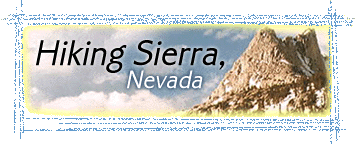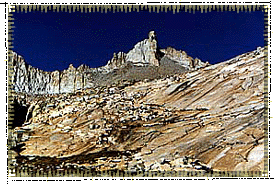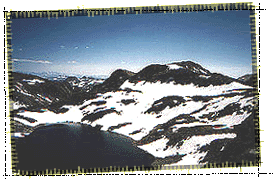 |
 |
 |
|
|||
|
Hiking Sierra, Nevada
My mind doesn't go with the flow, it starts cataloging the parts of my body that hurt. Spine, shoulders, lungs, calves, little toes. head and lips. And just to rub it in at the top of the pass, I run into Stephanie Blackmore of San Diego. Not a member of our party...
For the rest of us mere mortals, climbing mountains with a fifty pound pack usually conquers us. The second day is the toughest. We're climbing our most forbidding pass, taking us 4,000 feet higher than where we started yesterday. Glen Pass is no more than a slight lowering in a wall of 13,000 foot mountains that we ascend by seemingly endless switchbacks. At the top, the trail goes over a knife-edge and descends across a slope so steep it drops away into apparent nothingness. For the last two weeks we've been checking conditions on the Internet. The pass is open, but snowbound. By the time we get there black clouds are threatening overhead. At this elevation, thunderstorms can drop temperatures up to thirty degrees in a few minutes. We have to get down fast, but Dee Kirkhouse, a writing teacher, has altitude sickness. Michael Thornton, who maintains the computer network in Yosemite, is nursing a fear of heights.
I start to think we're about to enact our own version of Jon Krakauer's book Into Thin Air. Under the joking is real fear. Inching her way down the snowfield with experienced hiker Karen Najarian for support, Dee Kirkhouse almost freezes up.
It takes about two hours but we get down safely - just before the rain sets in. Hiking veteran, Rolland Carlson.
The decent from Glen Pass brings us to our destination. The Rae Lakes basin is a wonder of the Sierra Nevada. A mountain called Painted Lady is colored like a pebble you might pick up on the beach and turn over in your hand, marveling at the blackness streaked with orange. Dragon Peak rears an ugly face like a gila monster. And the Rae Lakes, fed by waterfalls of snowmelt, are like a necklace of little blue jewels. The sun has come out and it's warm enough to make the water look tempting.
When we started the trip, not everyone knew each other, but after a few days of crawling out of sleeping bags under the same sunrise and washing grime off in the same lakes, we're pretty close. The worst of the hiking is over, we move camp each day and spend time doing what each of us loves to do here in the wilderness. For me that's scrambling up to the nearest peak to find the best view. But Rick Najarian skips the peaks because they lack a crucial ingredient...
A few feet off I spot a six inch trout idling around in the clear water looking for food.
A few five second fish and you have supper. Rick hands some fish over to John Brennan. John is a technical writer, one of the strongest hikers and the most creative cook in the group. His specialty is making feasts out of food harvested in the mountains.
Besides a few fly-hungry fish, these mountains are home to an assortment of other animal and plant survivors. Locked up for eight months of the year in snow it takes some fancy footwork to stay alive here. The rosy finch ekes out a living by picking frozen insects off snowbanks. "Sky pilot" is a little blue flower with the fragrance of lilac. It only grows on passes so high and windswept that the snow doesn't build up there. Summer in the mountains is short and all of the flowers bloom together.
People have been spending the summer in these mountains for thousands of years. Prehistoric Indians came up hunting deer and gathering roots and grasses. They held trading festivals in the alpine meadows, exchanging goods like obsidian arrowheads and pinenuts with people from the other side of the mountains. Even now people live here during the summer. Vance Vredenburg spends four months every year studying the endangered yellow-legged frog. He says when you stay here a long time you notice the details.
The mountains are full of sounds you wouldn't hear anywhere else like the musical sound of footsteps on loose granite and the haunting sound of wind blowing through the holes of a metal walking stick... It's our sixth and last full day. We're all feeling pretty strong by now and we're not in a big hurry to leave. We've forgotten about our jobs and found a natural rhythm in which time itself seems to slow down. We almost feel as if we could hike for ever. Writer and photographer Karen Najarian dreamed up the trip.
Later that day, hiking on the trail, we get caught in a huge rainstorm. We huddle under a small tarp strung between trees and play word games and make tea to pass the time. We don't have our tents set up. We're cold and tired and we feel exposed. And for a moment we're reminded again of the risks of being out here ...the fact that far from our electronic toys, we're dependent on our own resources and on each other for our safety. But it's that simplicity that we come for. It's just us, and the mountains, and the weather. |
 | American Public Media Home | Search | How to Listen ©2004 American Public Media | Terms of Use | Privacy Policy |

 The worst thing about backpacking is cramming seven
days of food into a hard plastic bear can, all the while
knowing you're going to have to carry it on your back for
the next week. There are eight of us backpacking to Rae
Lakes in Kings Canyon National Park. We start hiking at
a place called Onion Valley, which is a huge granite bowl in
the Eastern Sierra. Three magnificent cascades tumble out of
the mountains which soar high above. We strap ourselves into
our PTDs, or personal torture devices, which most people
call backpacks...and we start jamming up the trail. Rolland
Carlson, is the graybeard of the trip. He's been hiking for
twenty seven years and he says if he doesn't get goal
oriented about getting to the top then he does just fine.
The worst thing about backpacking is cramming seven
days of food into a hard plastic bear can, all the while
knowing you're going to have to carry it on your back for
the next week. There are eight of us backpacking to Rae
Lakes in Kings Canyon National Park. We start hiking at
a place called Onion Valley, which is a huge granite bowl in
the Eastern Sierra. Three magnificent cascades tumble out of
the mountains which soar high above. We strap ourselves into
our PTDs, or personal torture devices, which most people
call backpacks...and we start jamming up the trail. Rolland
Carlson, is the graybeard of the trip. He's been hiking for
twenty seven years and he says if he doesn't get goal
oriented about getting to the top then he does just fine.
